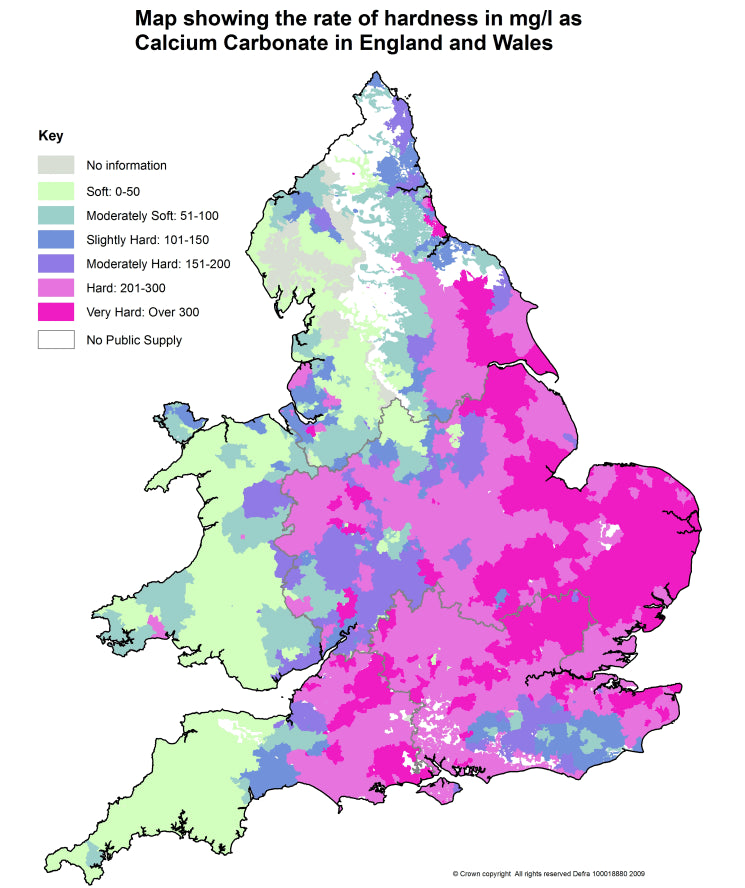For Water Quality Month, let's take a look at one classic issue many UK households have to contend with: water hardness.
When describing our tap water, many of us will be familiar with the terms "hard" and "soft". But what, exactly, do they mean, and why are some water supplies harder than others? What are the implications of having hard or soft water, and what tell-tale signs are there I might have hard water?
What do we mean by "hard" and "soft" water?
Water is characterised as hard if it has a high mineral content - more specifically, a high calcium and magnesium content. Soft water, on the other hand, has a lower content of these minerals present.
How does water become "hard" or "soft"?
Our water goes on a long journey from being freshly-fallen rainwater to eventually coming out of our household taps. Water is an incredible solvent - it can dissolve other substances very easily and effectively. On the way to the treatment works, water picks up many of the Earth's minerals and solutions as it passes through rocks, chalk, limestone, sand and soil.
As discussed, the main culprits for "hard" water are calcium and magnesium carbonates - the more it dissolves of these, the harder it will be.
In different parts of the UK, water has to pass through varying landscapes, sediments and natural rock structures, leading it to pick up differing levels of minerals. If the rainwater falls onto porous rocks such as limestone, the water passes through and picks up more minerals such as calcium which makes it hard.
In other parts of the UK, the water tends to fall on non-porous rock, such as granite. In these areas, the rainwater doesn't permeate, causing the water to pick up fewer minerals. The resulting water will be soft.
The effects & costs of hard water
Most people will know that hard water can be somewhat of a nuisance.
As it heats up, the calcium separates and spreads out. These deposits accumulate over time, resulting in a film or scaly residue, which forms a layer. This is known as limescale and can build up on taps, kettles and other appliances at home and in the workplace.
As well as being unsightly, there's a financial and environmental cost to hard water. Domestic appliances that are clogged with limescale such as kettles, irons and dishwashers, demand more time and energy to heat up water. This costs you more money and energy, ultimately impacting your household bottom line, as well as meaning it takes longer to make that cup of tea!
There's another added downside to hard water. It has a poorer performance with soap and detergents. As the water already has a high mineral content, it is more difficult to form a solution with.
That's not to mention the potential corrosive damage to pipes; hard water can affect the efficiency of many household and industrial systems, causing appliances to wear out more quickly. Aside from that, cleaning limescale is simply an unwanted chore for many people, adding yet another cleaning task to an often mounting list.
Is hard water bad for you?
The UK has some of the best water in the world; it is strictly and rigorously tested to be safe for consumption. Despite much debate, fortunately, there is no credible evidence that hard water poses a health risk to humans. According to the World Health Organisation, hard water may even be beneficial to those who are marginal for magnesium or calcium intake.
However, hard water has been implicated in causing or exacerbating skin sensitivities. A recent study concluded that ˜living in a hard water area is associated with an increased risk of atopic dermatitis(eczema); it's also been reported that the minerals in hard water, as they deposit on your scalp, can cause irritation. Anecdotal evidence suggests that it can make your hair appear flat and straw-like.
Is my water soft or hard?
Most people will be able to get a measure of their water's quality by looking for the tell-tale signs of hard water:
- A crusty deposit around taps and showerheads
- Furred up kettles and other appliances
- A light film on your tea or coffee
- Difficulty in lathering shampoo or shower soap
- Dry skin after washing
- A soapy leftover layer in your shower or bath.
In the UK, water tends to be hardest in the South East and London, the Midlands and eastern Wales. As you move further north into northern England and Scotland, the water becomes much softer. The South West of England, western Wales and Northern Ireland also tend to have very soft water. As we discussed, this is down to the permeability of the surface that the rainwater lands on. Limestone surfaces, by allowing water to penetrate, create mineral-heavy hard water. Granite, on the other hand, doesn't allow the water to dissolve sediments as easily.
For an interesting regional breakdown in England and Wales, the below map of water hardness was made available by the Drinking Water Inspectorate.
Safeguard the quality of your drinking water with Doulton
Do you have issues or concerns with the quality or hardness of the water in your area? Doulton's range of products provides the perfect solution - we've been at the cutting edge of drinking water filtration technology for nearly two hundred years.
Our CleanSoft® limescale reduction cartridge, used in the first chamber of our DUO & BioTect Ultra® under-counter water filter system, works by reducing calcium in the water that comes out of your tap. The minimises the build-up of limescale on kettles and taps, reduces the temporary hardness in drinking water, as well as prevents the dreaded film from building up on your tea!
If you have other contaminants in the water that's coming out of the tap in your area, from chlorine or nitrate to sediment or fluoride, explore our range of water treatment cartridges.
Safeguard your drinking water and taste the Doulton difference. More about water hardness.






